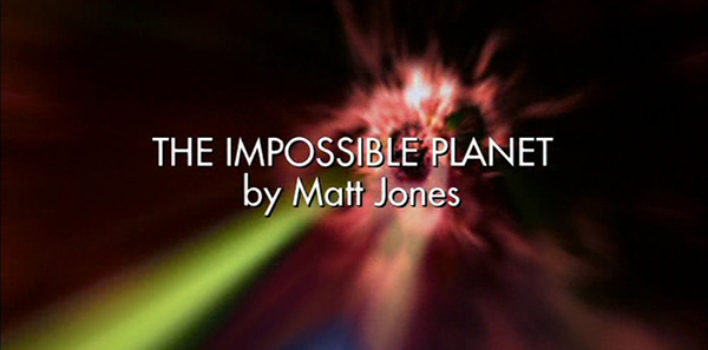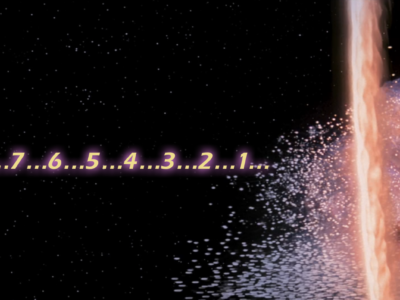Who-ology| S02E08 The Impossible Planet & S0209 The Satan Pit
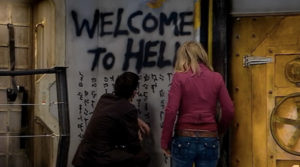 This two-part episode is one of the most thorough and honest discussions of faith that I’ve seen in television. A well-written exploration of truth, it is as personal as it is open-minded.
This two-part episode is one of the most thorough and honest discussions of faith that I’ve seen in television. A well-written exploration of truth, it is as personal as it is open-minded.
Our plot is shrouded in mystery. The Doctor and Rose arrive on a planet that inexplicably orbits a black hole. There, a small crew lives on a base, drilling into the ground with the hopes of finding an answer to the big question: why?
As he opens an observation window to show them the black hole, the captain warns the Doctor and Rose, “Brace yourselves. The sight of it sends some people mad.” And sure enough, it is a terrifying sight. “A black hole’s a dead star,” the Doctor processes aloud, transfixed by the phenomenon overhead. “It collapses in on itself, in and in and in until the matter’s so dense and tight it starts to pull everything else in too. Nothing in the universe can escape it. Light, gravity… time… everything just gets pulled inside… and crushed.” They watch in awe as whole civilizations and star systems are sucked in, gone forever. The churning, hungry mouth of the thing eats and eats without end, its incredible power undeniable.
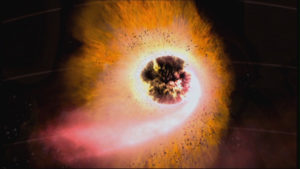 “Nothing in the universe can escape it”…except they are. All reason dictates that they should be pulled into the void, and yet they remain suspended in space by no design of their own, and without knowing if or when they will go plunging into that nothingness. Although the crew has a somewhat mixed response to their situation, it is clear that on some level, each person has developed a kind of functional faith in the power that keeps them from the grip of the power hovering over them.
“Nothing in the universe can escape it”…except they are. All reason dictates that they should be pulled into the void, and yet they remain suspended in space by no design of their own, and without knowing if or when they will go plunging into that nothingness. Although the crew has a somewhat mixed response to their situation, it is clear that on some level, each person has developed a kind of functional faith in the power that keeps them from the grip of the power hovering over them.
Ida: “In the Scriptures of the Valtino, this planet is called Krop Tor, “the bitter pill.” And the black hole is supposed to be a mighty demon, who was tricked into devouring the planet. Only to spit it out, ’cause it was poison.”
Their existence is a precarious one, and yet they allow themselves to feel somehow safe on the edge of utter annihilation. They blindly trust in the unexplained restraint of an untamable power that they don’t understand—one whose complete purpose is to consume and destroy.
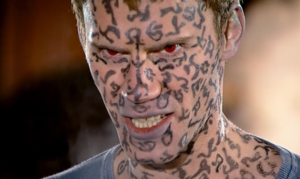 Events escalate as a disembodied voice takes over crew members to announce itself with a litany of frightening messages, then cause them to do violence to one another.
Events escalate as a disembodied voice takes over crew members to announce itself with a litany of frightening messages, then cause them to do violence to one another.
The Voice: “He has woven himself in the fabric of your life since the dawn of time. Some may call him Abaddon. Some may call him Krop Tor. Some may call him Satan. Or Lucifer. But do not despair. The Deathless Prince. The Bringer of Night. These are the words that shall set you free.”
Those on board the base respond to this revelation with a mix of confusion, shock and fear. But the Doctor’s first response is downright nonchalant. He finds it impossible to believe that the voice is what it claims to be: Satan.
The Voice of the Beast: “This is the Darkness. This is my domain. You little things that live in the light… clinging to your feeble Suns…”
The Doctor: “If you are the Beast, then answer me this: which one? Hmm? ‘Cos the universe has been busy since you’ve been gone. There’s more religions than there are planets in the sky. The Archivits… Pordonity, Christianity… Pash-Pash, New Judaism… Sanclar… Church of the Tin Vagabond, which devil are you?”
The Voice of the Beast: “All of them.”
The Doctor: “What, then you’re the truth behind the myth?”
The Voice of the Beast: “This one knows me, as I know him. The killer of his own kind.”
The Doctor: “How did you end up on this rock?”
The Voice of the Beast: “The disciples of the Light rose up against me. And chained me in the pit for all eternity.”
The Doctor: “When was this?”
The Voice of the Beast: “Before time.”
The Doctor: “What does that mean?!”
The Voice of the Beast: “Before time.”
The Doctor: “What does “before time” mean?”
The Voice of the Beast: “Before light and time and space and matter. Before the cataclysm. Before this universe was created.”
The Doctor: “That’s impossible. No life could have existed back then.”
The Voice of the Beast: “Is that your religion?”
The Doctor: “It’s a belief.”
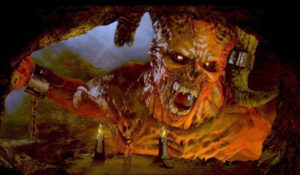 The Beast, for all the uncertainty of his identity, is able to tell each of them truths about themselves and their lives that he should not know. It is this ability that offers validity to his claims and causes everyone to reconsider their position; especially the Doctor. Although the Beast remains a mystery to the Doctor, he finds that he cannot dismiss him. In the end, the Doctor is forced to take the Beast seriously, conceding both that the Beast exists, and that for all his posturing, the Doctor himself has beliefs that require faith beyond sight.
The Beast, for all the uncertainty of his identity, is able to tell each of them truths about themselves and their lives that he should not know. It is this ability that offers validity to his claims and causes everyone to reconsider their position; especially the Doctor. Although the Beast remains a mystery to the Doctor, he finds that he cannot dismiss him. In the end, the Doctor is forced to take the Beast seriously, conceding both that the Beast exists, and that for all his posturing, the Doctor himself has beliefs that require faith beyond sight.
The Doctor: “I believe… I believe I haven’t seen everything, I don’t know… it’s funny, isn’t it? The things you make up, the rules. If that thing had said it came from beyond the universe, I’d believe it, but before the universe… impossible. Doesn’t fit my rule. Still, that’s why I keep traveling. To be proved wrong.”
Two particularly compelling arguments for Truth are openly explored by this episode:
1) The idea that there is Common Grace that all humans trust in and rely on—Believer and Non-believer alike—such as oxygen, sunlight, gravity. In this case, we have a group of people, varied in race, age, skill, and belief, who share common faith in the planet’s gravity keeping them from falling into the black hole;
2) The possibility that multiple versions of foundational stories or “myths” (Creation, the Fall, the Flood…Satan) are echoes of One True Story.
In our time and our world, the implications of such ideas seem merely theoretical. In this episode, we get a glimpse of what it would mean to come face to face with such Truth and be called to action. Not only are their lives at stake, but the fate of all the universe depends on their believing the truth before them. They do not have the luxury of disbelief. They believe or they die.
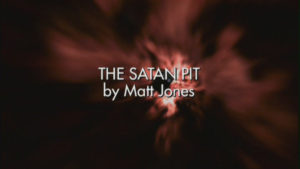 Yes, this is the choice that we all face—us Beings with Souls—and it is this appeal to self-preservation that many religious people rely on to drive people to faith. Though we often cannot see it with the naked eye, there is an Evil whose origin and character are hinted at in all the stories. Just like the Krop Tor crew, we too hover on the edge of an abyss from which we have no power to save ourselves. Were it not for a loving and mighty hand, we would go plunging into that endless darkness—all that we are or could be– devoured forever.
Yes, this is the choice that we all face—us Beings with Souls—and it is this appeal to self-preservation that many religious people rely on to drive people to faith. Though we often cannot see it with the naked eye, there is an Evil whose origin and character are hinted at in all the stories. Just like the Krop Tor crew, we too hover on the edge of an abyss from which we have no power to save ourselves. Were it not for a loving and mighty hand, we would go plunging into that endless darkness—all that we are or could be– devoured forever.
That is the good news: not only is there True Evil, but there is also True Good, and it it is He whose hand holds back the darkness and on whose common grace we all rely. He is the Maker of the Universe who holds everything together, and the Author of the one true story at the heart of all stories. He saves us from darkness, but that is not even the most compelling reason to put faith in his story:
The story of God and the heroic rescue of man by Jesus is the most beautiful story you can imagine, full of true love and victory over evil. And many people have been arrested by its beauty, retelling pieces of this tale across time and culture. It doesn’t just promise that we will be saved from darkness, but that it will be redeemed, turned into the beauty we crave and making it vivid and forever. This is not only a story worth knowing, but the only one worth the risk of faith.


